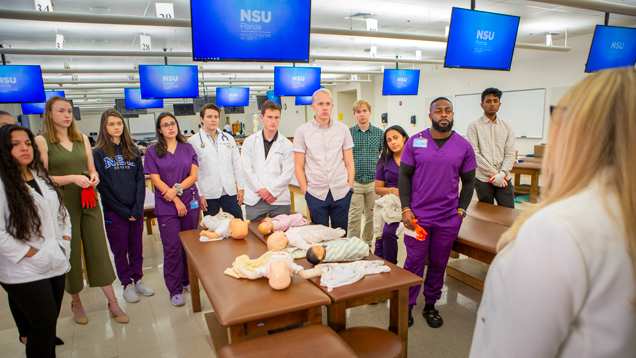Elevating Our Impact
At Nova Southeastern University’s Dr. Kiran C. Patel College of Allopathic Medicine (NSU MD), we are dedicated to fostering a culture of curiosity, discovery, and scholarly excellence. Our research spans a diverse array of disciplines, from cutting-edge scientific breakthroughs to groundbreaking social and humanities work that seeks to improve the health care ecosystem.
Through collaborative partnerships and state-of-the-art facilities, our esteemed faculty and passionate students engage in impactful research that addresses the pressing challenges of today and pushes the boundaries of knowledge. At NSU MD, the pursuit of knowledge knows no bounds. Welcome to a community where curiosity sparks discovery and research transforms the world.
Bold Vision. Billion Dollar Impact.
Nova Southeastern University's Dr. Kiran C. Patel College of Allopathic Medicine (NSU
MD) emphasizes collaboration as a key to advancing human health.
We partner with scientists from throughout the globe in our efforts to develop improved
treatment options for patients.
Partnerships to Advance Human Health
Working in close collaboration with NSU MD colleagues, researchers in the NSU Cell Therapy Institute are dedicated to innovative translational biomedical research, focused on the discovery and development of cell-based therapies to prevent, treat, and cure life-threatening and debilitating diseases.
Together, we are achieving exciting breakthroughs to reduce lag time involved in translating discoveries from bench to bedside by developing a full-circle investigative process to expedite discoveries.
NSU MD reaches far beyond state and national borders to advance discoveries using a collaborative approach and providing students with direct exposure to world-class medical sciences research. We seek out the strongest global expertise and talent, integrating that research and education into our curriculum.
Additional strategies are being developed to further promote the quality of medical education at NSU MD, while simultaneously advancing the application of experimental research discoveries to improve patient care in the real world.

NSU MD Student Research
At NSU MD we believe in empowering the next generation of researchers. Our faculty researchers support student success through mentorship to cultivate the next generation of scholars and professionals. NSU MD students engage in complex, real-world issues, explore their intellectual curiosities, and make a meaningful impact on society.


